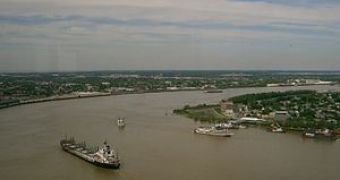It was only yesterday when the news broke that the lack of snow brought about by climate change had to be hold accountable for the fact that the tourism industry in the US was losing both profits and job opportunities.
Coupled with the severe droughts that have recently hit the country, the same record low snowfalls are now listed as the main reasons for which the Mississippi River might soon be forced to shut down for navigation.
Having the Mississippi River no longer available for navigation purposes is bound to translate into the country's economy losing yet another $2 billion (roughly €1.54 billion).
Environmental Leader explains that, according to a report published by the US National Oceanic and Atmospheric Administration, a mere 7% of the country's entire surface is presently covered in snow.
As if this were not enough, 60.2% of the contiguous US is still experiencing drought conditions.
Because of this, the American Wetlands Foundation went as far as to state that, all things considered, the portion of the Mississippi found between St. Louis and Cairo, Illinois, is quite likely to no longer support navigation as early as next month.
Jim Angel, an Ilinois state climatologist, wished to draw attention to the fact that, although too little media attention is given to this issue, roughly 80% of the upper Missouri and the Mississippi basins are presently trying to overcome the effects of prolonged periods of drought.
“We’re not proactive in how we manage the river. This system is getting ready to bounce out of its engineered channel and go somewhere else.”
“And when it does, it’s going to be a huge mess. We’re dealing with aging infrastructure, which means we have an engineering problem, and it’s a serious one,” J. David Rogers from the Missouri University of Science and Technology added.
For those unaware, the Mississippi River Basin is presently supplying roughly 86% of the water needed to grow crops such as corn and soybeans in the US.
As well as this, it is also intensely used to transport goods from one part of the country to another, which basically means that its being hit by climate change stands to cripple the country's national economy.

 14 DAY TRIAL //
14 DAY TRIAL //